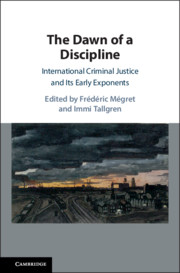Book contents
- Reviews
- The Dawn of a Discipline
- The Dawn of a Discipline
- Copyright page
- Contents
- Contributors
- Foreword
- 1 Introduction
- 2 Hugh H. L. Bellot
- 3 Vespasian V. Pella
- 4 Emil Stanisław Rappaport
- 5 International Criminal Justice as Universal Social Defence
- 6 Henri Donnedieu de Vabres
- 7 Not Just Pure Theory
- 8 Principled Pragmatist?
- 9 Retelling Radha Binod Pal
- 10 Aron Trainin
- 11 The Complex Life of Rafal Lemkin
- 12 Stefan Glaser
- 13 Yokota Kisaburō
- 14 Jean Graven
- 15 Absent or Invisible?
- Index
5 - International Criminal Justice as Universal Social Defence
Quintiliano Saldaña (1878–1938)
Published online by Cambridge University Press: 04 September 2020
- Reviews
- The Dawn of a Discipline
- The Dawn of a Discipline
- Copyright page
- Contents
- Contributors
- Foreword
- 1 Introduction
- 2 Hugh H. L. Bellot
- 3 Vespasian V. Pella
- 4 Emil Stanisław Rappaport
- 5 International Criminal Justice as Universal Social Defence
- 6 Henri Donnedieu de Vabres
- 7 Not Just Pure Theory
- 8 Principled Pragmatist?
- 9 Retelling Radha Binod Pal
- 10 Aron Trainin
- 11 The Complex Life of Rafal Lemkin
- 12 Stefan Glaser
- 13 Yokota Kisaburō
- 14 Jean Graven
- 15 Absent or Invisible?
- Index
Summary
Quintiliano Saldaña Garcia-Rubio (1878–1938) was a leading proponent of legal pragmatism in European criminal law circles in the interwar period. The first part of this chapter surveys his formative years and his early academic professional development, examining the influence of Franz von Liszt’s Marburg School of Criminal Law on his academic interests and early professional career. The second examines Saldaña’s seminal theory of ‘universal social defence’ and his 1925 Hague Academy course which included one of the first projects for an international criminal code, and reviews Saldaña’s legislative contribution to the 1928 Spanish Criminal Code project, an example of a proto-fascist criminal code. The third follows Saldaña’s career during the Second Spanish Republic, his criminal law and criminology work in the development of his theory of ‘legal pragmatism’, and revisits his engagement with the mid-1930s international legal debates on terrorism in the framework of the International Bureau for the Unification of Criminal Law. The conclusion revisits the mysterious circumstances of Saldaña’s death during the Spanish Civil War and the dark legacy of his legal thought on the criminal law system of General Franco’s regime.
Keywords
- Type
- Chapter
- Information
- The Dawn of a DisciplineInternational Criminal Justice and Its Early Exponents, pp. 118 - 145Publisher: Cambridge University PressPrint publication year: 2020



